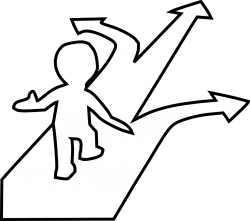10 Often-Confused Words
 Image by Clker-Free-Vector-Images from Pixabay
Image by Clker-Free-Vector-Images from PixabayA few years ago, I wrote a book about confusing word pairs/groups. And I have done some blog posts about them in the past. This post begins a series of posts (probably not every week) about the most commonly confused words.
1 Oh, what would this list be without affect and effect! Most of the time, affect is a verb and effect is a noun.
This rainy weather certainly affects my mood! (verb – action word)
What effect does the rainy weather have on your mood? (noun – thing)
But of course nothing is quite that simple. A small percentage of the time, they switch part of speech: affect (pronounced with an a like in cat and the emphasis on the first syllable) is a noun and effect is a verb.
He is nice, but he has a strange affect. (way of being or presenting herself)
The new mayor said she will effect great change in the city.
2. Age and aged. Age is a present tense verb or a noun. Aged is a past tense verb or an adjective.
He is the same age as I am. If you don’t take care of yourself, you may age poorly.
My brother, aged 9, is in fourth grade. These apartments are for an aged population. This cheese has aged well.
3. Almost and most. The general rule is that if you can use almost, use it. If almost doesn’t make sense, use most.
Almost everyone is going to the wedding. (not Most everyone)
Most of the people are attending. (correct, because Almost of the people doesn’t make sense.)
4. Alright and all right. Already is a word. Altogether is a word. But alright is a slangy word.
All right as two words is always correct, no matter what the usage is.
Are you all right? All right, I will go.
5. Amoral and immoral. If you are amoral, you don’t really have a moral code. If you are immoral, you have no morals.
It is immoral to steal. The murderer seemed amoral and did not know the difference between right and wrong.
6. Amount and number. Like our old friends less and fewer, one is used for singulars and things that cannot be counted (amount), and the other is used for plurals and things that can be counted (number).
The number of accidents on this corner has decreased during the past few months. (Note the singular verb.)
The amount of crime in this neighborhood has increased lately.
7. Anxious and eager. Anxious is often used when you mean eager.
I am eager to travel to Italy next year. (not I am anxious to travel, unless you are worried about it.)
I am anxious about the math test.
8. Any more and anymore. Both are correct but used differently.
I don’t work there anymore. (any longer). Would you like any more cake? (additional)
9. Any one and anyone. Both are correct, but used differently.
Is anyone here? Anyone can fix this (refers to some person.)
Any one of these suits will do. (doesn’t necessarily refer to a person — although it can refer to people — and usually followed by of)
10. Anyway, anyways, any way. First, we can just eliminate anyways because we say anyway.
Take this cake because I don’t like chocolate anyway. ( meaning the same as anyhow)
Is there any way you can come into work tomorrow? You can drive there any way you want. (in any manner)
Be safe and be well!



